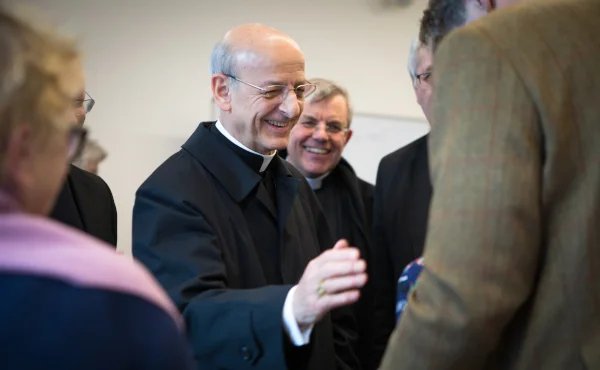Since 23 January 2017, Msgr. Fernando Ocáriz has been the Prelate of Opus Dei.
The auxiliary vicar is Monsignor Mariano Fazio, the general vicar is Rev. Antoni Pujals, and the vicar secretary is Rev. Jorge Gisbert.
The central headquarters of the prelature's curia is located at Viale Bruno Buozzi 73, 00197, Rome, Italy.
The Prelature of Opus Dei is governed by the provisions of the general law of the Church, by the apostolic constitution Ut sit, and by its own Statutes (or code of law specifically applicable to Opus Dei). The Code of Canon Law of 1983 sets out the basic provisions covering personal prelatures (canons 294-297), modified by the motu proprio Le Prelature personali dated 4 August 2023.
Priests of the Prelature depend fully on the Prelate. He assigns to them their pastoral responsibilities, in the fulfillment of which they closely follow the pastoral guidelines for the diocese in which they live. The Prelature is responsible for the financial support of its priests.
The lay faithful also depend on the Prelate in all that refers to the specific mission of the prelature. They are subject to the civil authorities in the same way as any other citizen, and to other ecclesiastical authorities in the same way as any other lay Catholic.
In Opus Dei, the Prelate governs with the help of the auxiliary vicar, the general vicar, and the central vicar secretary. In addition, he is assisted by a council of women, the Central Advisory, and a council of men, the General Council. Both are based in Rome.
The members of the general council are Josemaría Sánchez Blanco, Marcelo Valenga, Andrew Joseph Laird, Luis Romera, and Julien Nagore.
The central advisory is composed of Isabel Sánchez Serrano, María Díaz Soloaga, Nicola Waite, Fernanda Lopes, Kathryn Plazek, Inocencia Fernández, Susana López, and Rosário Líbano Monteiro.
Also part of the full councils are the regional delegates in the various circumscriptions into which the apostolic work of the prelature is geographically divided, currently 25, covering 68 nations.
In addition to the names above, the prefect for spiritual formation (Pau Agulles) and the representative before the Holy See (Paul O'Callaghan) also collaborate with the central bodies of government.
The governance of the prelature is collegial: the Prelate and his vicars always perform their roles with the cooperation of the corresponding councils, mostly composed of laypeople.
General congresses of the Prelature are usually held every eight years. They are attended by members from the countries in which Opus Dei is present. At these congresses the work of the Prelature is studied, and the proposed direction of its future pastoral activity is presented to the Prelate. During the congress the Prelate appoints new councils.
The Prelature is divided into areas or territories called regions. At the head of each region, whose limits may or may not coincide with those of a particular country, is a regional vicar and two councils: a Regional Advisory for women and a Regional Commission for men. Some of the regions are further subdivided into delegations. Within the limits of its territory, a delegation has a corresponding governmental organization: a vicar of the delegation and two councils.
No office of government, other than that of the prelate, is held for life.
Finally, at the local level, there are the centers of Opus Dei. These are dedicated to organizing means of formation and pastoral care for the faithful of the Prelature in a particular area. Centers may be for women or for men. Each center is governed by a local council, which is headed by a layperson (the director), and consists of at least two other faithful of the Prelature. For the priestly care of the faithful attached to each center, the Ordinary of the Prelature assigns a priest from his presbyterate.
All the faithful of the Prelature are responsible for providing for their own personal and family needs by means of their ordinary work. Besides covering their own living expenses, the members of Opus Dei and the cooperators also take on responsibility for the costs incurred in the carrying out of the pastoral work of the Prelature. They often promote and support entities that facilitate this pastoral activity, such as houses for formational activities and spiritual retreats.
The costs of the Prelature are essentially those relating to the support and formation of the priests of the prelature, and of the curia of the prelature and the central offices in each region or delegation, and the alms which the prelature provides. Naturally, the faithful of Opus Dei also contribute to their local churches, parishes, etc.
